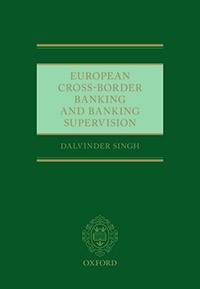Warwick Law School News
Warwick Law School News
The latest updates from our department
New Book from Professor Dalvinder Singh on European Cross-Border Banking
 Professor Dalvinder Singh’s new book on ‘European Cross-Border Banking and Banking Supervision’ was published in April 2020 by Oxford University Press.
Professor Dalvinder Singh’s new book on ‘European Cross-Border Banking and Banking Supervision’ was published in April 2020 by Oxford University Press.
This new work provides timely analysis of the cross-border exercise of banking activity in the EU and its supervision, from the perspective of the 'home-host rule'. It examines the current system and the efficacy of recent reforms considering whether the centralisation of decision making and a more effective mutualisation of financing tools could improve the safety and soundness of the EU banking system and reduce the asymmetry of information between home and host authorities.
The EU banking market is very integrated since banking institutions based in the Union are free to perform their activities within the single market. This has allowed EU banking institutions to significantly increase their cross border operations. This way of working is based on the home country control principle according to which EU institutions performing cross border activities continue to be supervised by their home country supervisor. However, this system has raised challenges for effectively performing supervision, resolution and crisis management of banking groups operating across the borders of many different jurisdictions.
This book analyses how far recent reforms under the banking union regime have addressed these issues to ensure the integrity and stability of the European integration project. It utilises data to illustrate the cross border exposures between Member States and how they influence home and host decision making. But it equally explores those areas that remain within the national discretion such as non-performing loans, insolvency-liquidation of banks and deposit protection arrangements, to mention a few.
The book analyses the main pillars of the banking union: the single supervisory mechanism (SSM); and the Single Resolution Mechanism (SRM) and the proposed European Deposit Insurance Scheme (EDIS); and the related tools designed to provide crisis management under the European Stability Mechanism (ESM). As such the work considers the impact of the Single Rulebook. In considering these pieces of regulation and mechanisms the book analyses how international standards and EU requirements undertake to divide responsibilities between the home and host state and the extent to which they align interests between the home and host and minimise potential conflicts of interests. In this analysis examples from a set of EU cross-border banks are used to illustrate the workings of home and host relationship between Member States and Third Countries, and the benefits of participating in centralisation of decision making and mutualisation of financing in resolution and depositor protection.
This work provides a valuable resource for academics researching the banking union and banking regulation, and helps academics and practitioners to address questions of supervision, resolution, and insolvency with a cross-border element.
